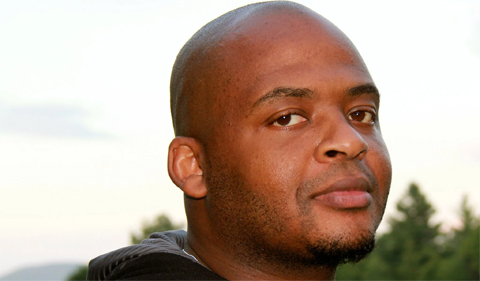
Kiese Laymon
Learn more about Kiese Laymon’s work and Lit Fest events
By Madison Foltz
Kiese Laymon begins Heavy with the insistence that he wanted to “write a lie.” But he then lists every reason why that lie was not worth writing. He doesn’t want to lie because he needs to be honest, because that honest reflection is exactly the opposite of what his mother would want from him. Laymon’s mother, we soon find out, is the most important and complicated person in his life: she is his teacher, his sometimes-friend, his protector, and his abuser all in one. A driven political science professor, she is never called by name; instead, Laymon addresses her as “you” throughout the book, a pointed and critical aspect of Heavy’s style that is part of what makes the writing so stunning, the candor so personal.
“You made me feel like the most beautiful black boy in all of Mississippi,” he writes, “until you didn’t.”
Kiese Laymon will be a featured author at this year’s Spring Literary Festival, which will take place from April 3 through 5. A professor of creative writing and English at the University of Mississippi, Laymon has authored a full-length novel (Long Division, 2013) and a collection of essays titled How to Slowly Kill Yourself and Others in America (2013), in addition to his highly regarded new memoir Heavy (2018). His reviews, essays, and stories have appeared in publications such as Vanity Fair, Oxford American, and LitHub, among others. Laymon’s writing is characterized by razor-sharp observation and rich eloquence that also exposes his deepest vulnerabilities, and Heavy is an example that pulls no punches. It addresses his family, racial inequality, the education system, and other things that have weighed him down.
And as the memoir’s title implies, much of the book deals with Laymon’s struggles with body
image; As the story unfolds, he weighs over 300 pounds at some points and under 170 at others. Martha Anne Toll writes in her review of Heavy for NPR, “Laymon intersperses stories of friends and girlfriends and teachers and books with a narrative about food—both its attraction and revulsion. His body is a character in this memoir, the body of a black man, objectified by the culture, threatened and threatening because of America’s long, ugly history of racial oppression.”
Everything that happens between those numbers on the scale tells the rest of Laymon’s story, as he deals with everything from a childhood in Jackson, Mississippi, filled with sexual violence, familial betrayal, and beatings, to his later expulsion from Millsaps College, a gambling addiction, his eventual graduation from Oberlin, and his battle against toxic racism all along the way. Throughout his story, he also links his own writing and struggles to those of authors like Toni Cade Bambara and Richard Wright. Like their work, Heavy is intense, powerful, important. It’s hard to read at times. It’s not only the story of a black male body trying to find its place in America, but also the story of all the reasons why that place may never be found. Laymon highlights how personal demons and toxic behavior can form a maelstrom within us that can keep us from thriving. “The nation as it is currently constituted,” he writes, “has never dealt with a yesterday or tomorrow where we were radically honest, generous, and tender with each other.”
In Heavy, and all of his work, Kiese Laynon makes that honest attempt. It’s no lie, and we readers are amazed by the result.



















Comments